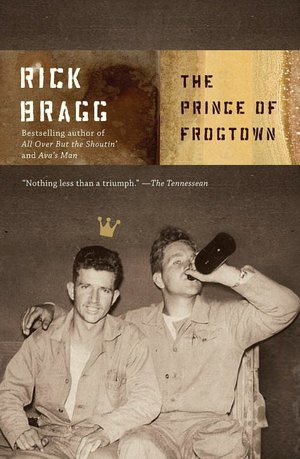 I read Rick Bragg’s wonderful All Over but the Shoutin’ years ago, before I even knew I preferred – well even liked – reading memoirs. The story of growing up in poverty in Alabama with a devoted, loving, hard-working mom, and a mostly absent alcoholic father, it managed to be, by turns, excruciatingly sad, laugh-out-loud funny, hopeless and life-affirming at the same time. If you love beautiful prose for prose’s sake, you will most likely enjoy this Pulitzer Prize winning author’s writing, with passages like this description of his dad:
I read Rick Bragg’s wonderful All Over but the Shoutin’ years ago, before I even knew I preferred – well even liked – reading memoirs. The story of growing up in poverty in Alabama with a devoted, loving, hard-working mom, and a mostly absent alcoholic father, it managed to be, by turns, excruciatingly sad, laugh-out-loud funny, hopeless and life-affirming at the same time. If you love beautiful prose for prose’s sake, you will most likely enjoy this Pulitzer Prize winning author’s writing, with passages like this description of his dad:
I will never forget the sight of him that day. He had on dress pants and loafers and a pretty shirt unbuttoned at the neck, to show his tattoo, but I cannot remember if he was sober or just well groomed. He had always been a clean drunk, a well-dressed drunk, what people in that time called a pretty man. He might be cross-eyed drunk, but his shoes were always shined, always the best-dressed man in jail. His children and wife might go without, but his shirts were always pressed. Some people had backbone to lean on. Daddy had starch.
All Over was, for the most part, his mother’s story, from Bragg’s childhood through current day. His father, Charles Bragg, is a central character, but as a ghost more than flesh and blood. In The Prince of Frogtown, he takes center stage, though his portrait is mostly painted by his friends and family’s memories, as opposed to his son’s direct experiences with his primarily absent father.
Interspersed throughout these humorous and harrowing recollections, the author places short chapters about “the boy”, the son of Bragg’s current day (at least in the writing of this book) paramour, known simply as “the woman” or the boy’s “mother”. These “episodes loosely parallel Bragg’s insights into his own dad, as he attempts to be a proper father and dare we say role model to this next generation of men.
Shoutin’ was a classic, but here the prose is even sharper, and more literary. The stories of his father are rich with detail, cinematic without being conscious of the camera. The contemporary essays about his new son are poignant, self-effacing and undeniably full of love and fatherly pride.
Speak Your Mind